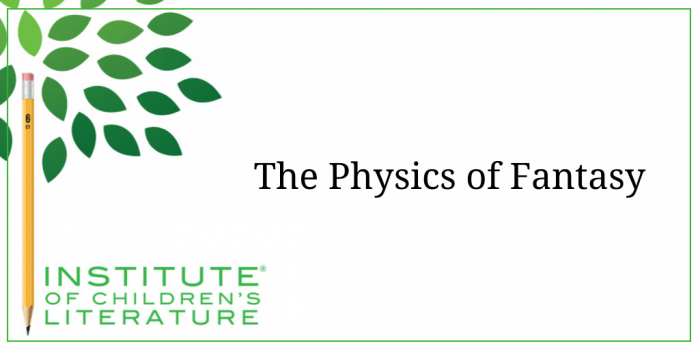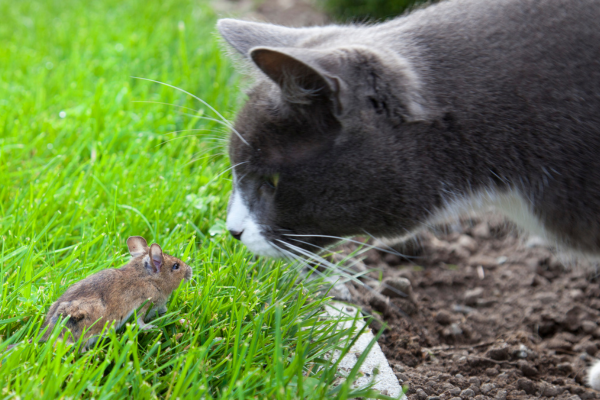1000 N. West Street #1200, Wilmington, DE 19801
© 2024 Direct Learning Systems, Inc. All rights reserved.

If you’ve tried writing fantasy in any form — picture books, magazine story, chapter book, or novel––you know that a key element of fantasy is that things happen in the story that cannot happen in real life. Thus, you are deciding that your story will violate natural universal laws in some way. Some stories only slip outside the real world a little, and some create a totally extreme world that has little “normal” in it. But all stories abide by rules – you just get to decide what those rules will be.
For instance, your story may feature a mouse and a cat who are friends. That’s a tiny variation from natural law. In real life, predators and prey rarely form friendships.

Suppose your cat and mouse can talk to one another. Thus, in your fantasy world, animals can think complexly and they can talk to one another. But now what rules do you decide you won’t violate? Maybe in my story, the cat and mouse live in a house with humans (with whom they interact only in very real animal-ish ways), but the cat and mouse are solving a mystery that involves a human. Maybe you decide they’re going to discover what happened to a missing item belonging to the cat’s owner.
Now I’m balancing real laws and fantasy laws. These characters now have to abide by a lot of “real world” rules. For instance, I will NOT talk about my cat or mouse using their hands or their fingers — they are animals and they have paws. I will probably not having them wear clothes, because they’re existing in a house like “real” animals.
Once I set rules in place, I must operate within them. I can have other animals talk to my animal characters as that is within the rules I’ve made. I won’t have the mouse suddenly begin flying — that doesn’t make sense with the rules I have made. I won’t have the cat whip up pancakes for his owner and then sit down and meow until she comes downstairs––that will feel awkward if I’m keeping reality in place. We know a cat (no matter how smart) simply couldn’t make pancakes.
This is a key concept with fantasy. It has to make sense. Whatever rules you break, you must break them in a consistent way. And you must break them in a way that makes sense with the rules you choose to keep. The weaving together of fantasy elements and “real” elements must make sense. Anytime it doesn’t; it will irritate the reader, pulling him or her out of the story flow. It will make your story fail.
Another key concept is “don’t surprise the reader with the fantasy.” In other words, don’t have five pages of perfectly normal story about a little girl and her normal kitty doing normal things and then suddenly have the kitty slip away to chat up the mouse about the mystery of what happened to the little girl’s homework. Instead, I’ll begin the story with a scene that shows us the fantasy in action, so that the reader slips into that fantasy without jolts and questions.
A plot may have intended surprises. Just don’t let one of them be that you haven’t handled the fantasy well. So as you write your wonderful fantasy story, remember:
make purposeful choices about the rules of your fantasy world,
employ them consistently, and
don’t let a very realistic story suddenly and illogically turn into a fantasy.
Manage those, and you can lead the reader anywhere.
With over 100 books in publication, Jan Fields writes both chapter books for children and mystery novels for adults. She’s also known for a variety of experiences teaching writing, from one session SCBWI events to lengthier Highlights Foundation workshops to these blog posts for the Institute of Children’s Literature. As a former ICL instructor, Jan enjoys equipping writers for success in whatever way she can.
1000 N. West Street #1200, Wilmington, DE 19801
© 2024 Direct Learning Systems, Inc. All rights reserved.
1000 N. West Street #1200, Wilmington, DE 19801
© 2024 Direct Learning Systems, Inc. All rights reserved.
1000 N. West Street #1200, Wilmington, DE 19801
© 2024 Direct Learning Systems, Inc. All rights reserved.
1000 N. West Street #1200, Wilmington, DE 19801
© 2025 Direct Learning Systems, Inc. All rights reserved.
1000 N. West Street #1200, Wilmington, DE 19801
©2025 Direct Learning Systems, Inc. All rights reserved. Privacy Policy.
1 Comment